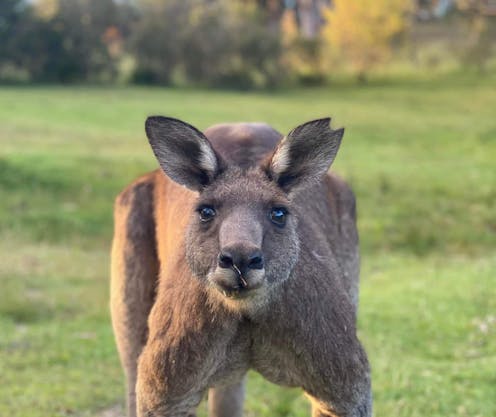I collect marsupial poo. A crack team of volunteers across Australia helps me out
- Written by The Conversation

I thought convincing my husband of the merits of my returning to study just as he had retired would be a very tricky sell. So his enthusiasm for the idea caught me by surprise.
He helpfully suggested several interesting topics: sea turtles, dugongs and coral reefs. If it involved a boat in a warm climate, he was behind me 100%.
But if you are going to dedicate three and a half years to studying a single topic, it really needs to excite you, and my interest in gut bacteria and health won out. Much to my hubby’s dismay, I chose to immerse myself in the subject of marsupial poo – and in retaliation he started calling me Dr Poo.
Fortunately, I am not alone in my faecal fetish. As any wildlife carer can tell you, monitoring what comes out of an animal is a vital part of keeping an eye on its health.
So when I set out to find volunteers to collect poo from wild and captive marsupials – specifically eastern grey kangaroos, swamp wallabies, red-necked wallabies, bare-nosed wombats, and ringtail and brushtail possums – over an area from Queensland to Tasmania, it was mainly wildlife carers who answered the call.
The Marsupial Microbiome Poop Troop
I enlisted a core group of around 20 people who, every season, dutifully went out in all weathers, armed with their forceps and zip-lock bags, to select fresh pellets from their in-care residents or wild animals that passed through. Then they filled in the paperwork, carefully labelled the bags and stored them in freezers until they could be posted in special temperature-controlled packaging to the university for genetic analysis.
We did this to establish a baseline of what the normal wild gut microbiome looks like in different animals in different areas at different times of the year. This lets us recognise if there is an imbalance in captive animals that can be addressed and prevented by changing diet or introducing supplements.
To aid my communication with these wonderful volunteers, I started a Facebook group page which became known as the Marsupial Microbiome Poop Troop. And it has some colourful members.
There is Kate, who obtains the freshest wombat poo by stalking wild wombats in her local reserve until they produce the goods. Don’t try this at home. Kate has serious wombat-whisperer skills.
Read more: What can you learn from studying an animal's scat?
There’s Darryl, who was devastated when the roof blew off his house in a storm and he was without power for two weeks. Not for his wrecked house or loss of possessions, but because his collection of possum poo thawed and he had to throw it away and start again.
Julie wins the prize for most prolific collector. Her poo parcels are the largest by far, and cover quite a few species. The supervisor of the university’s stores, who receives the poo parcels, is not always a fan of Julie’s efforts. He must have highly attuned olfactory senses as he routinely sends me emails announcing the arrival of more “animal excrement” or “malodorous packages” for immediate collection.
Saving orphaned joeys
While it all sounds like fun and games, the research we do with the collected poo has serious potential to save many marsupial lives. We have a particular focus on young orphaned joeys.
Whether their mothers were hit by cars, attacked by dogs, or died of other causes, the joeys arrive at wildlife shelters stressed, often injured, and generally cold and hungry. Because marsupials are born so undeveloped – and normally spend a long time in their mother’s pouch – they require an extended period in care when orphaned.
The gut microbiome of these “pinky” joeys is equivalent in development to that of premature human babies. It is still being established at this crucial time, via the mother’s milk, environmental conditions in the pouch, cleaning and grooming.
The sudden loss of parental care, coupled with the stress of being in captivity and a complete change of diet, can do a great deal of harm to the gut microbiota. This can leave the joey open to infections, diarrhoea and dehydration, which can be fatal.
If it were possible to fix this imbalance, the success rate of rearing orphaned marsupials would rise. Their improved general health should mean greater numbers of animals successfully reintroduced to the wild.
Read more: From the frontline: saving Australia's threatened mammals
While the animals involved in this study are considered “common”, the same principles may be applied to endangered species held in captive breeding programmes once it has been shown to work on the more prolific species.
Without the help of the Poop Troop volunteers, it would have been impossible to sample so widely and consistently. The remaining poo will be kept frozen and made available to future researchers, so these wonderful people have, through their dedication and persistence, made a real contribution to marsupial microbiome research that will continue to help wildlife in the future.







